Module 4 Home alone Unit 1 I can look after myself, although it won’t be easy for me课件(共32张PPT,内嵌音频)
文档属性
| 名称 | Module 4 Home alone Unit 1 I can look after myself, although it won’t be easy for me课件(共32张PPT,内嵌音频) |
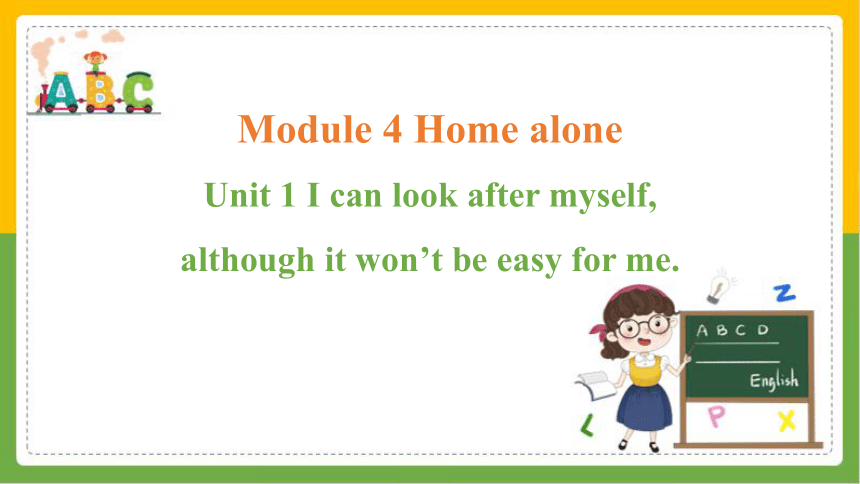
|
|
| 格式 | pptx | ||
| 文件大小 | 32.6MB | ||
| 资源类型 | 教案 | ||
| 版本资源 | 外研版 | ||
| 科目 | 英语 | ||
| 更新时间 | 2024-11-10 00:00:00 | ||
图片预览

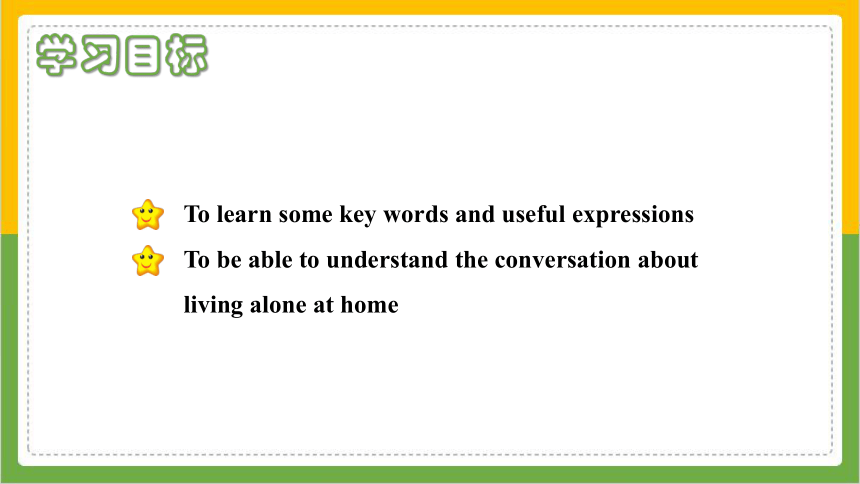
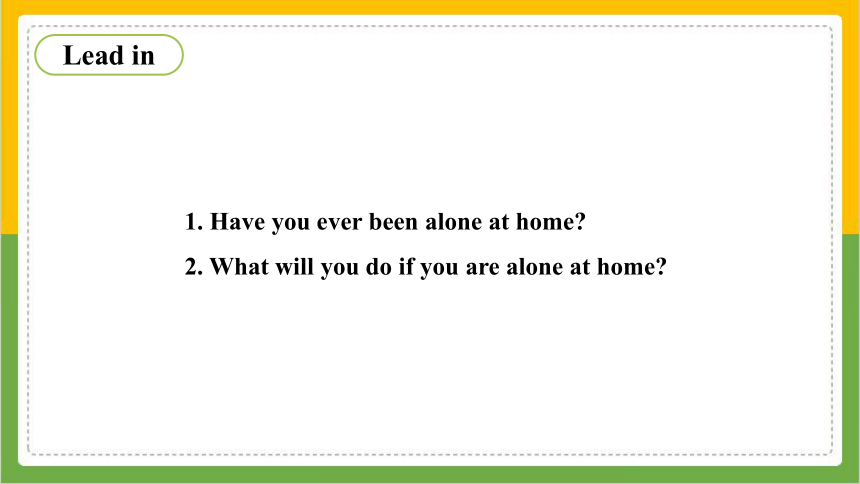
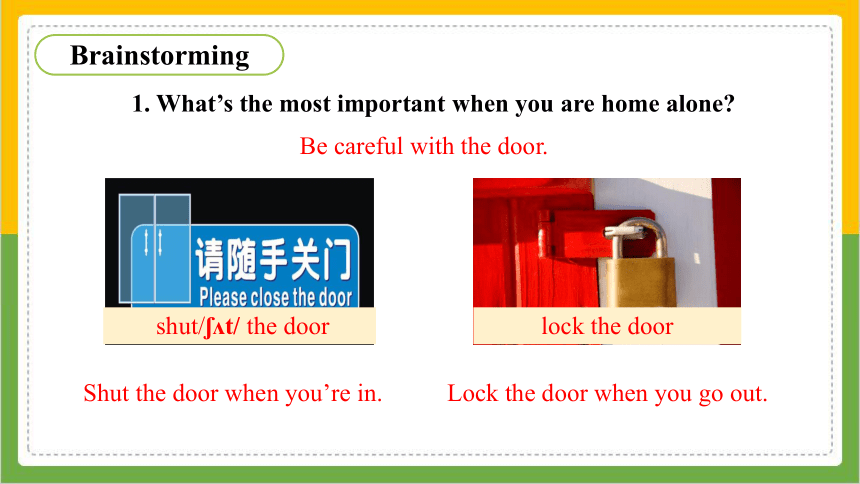
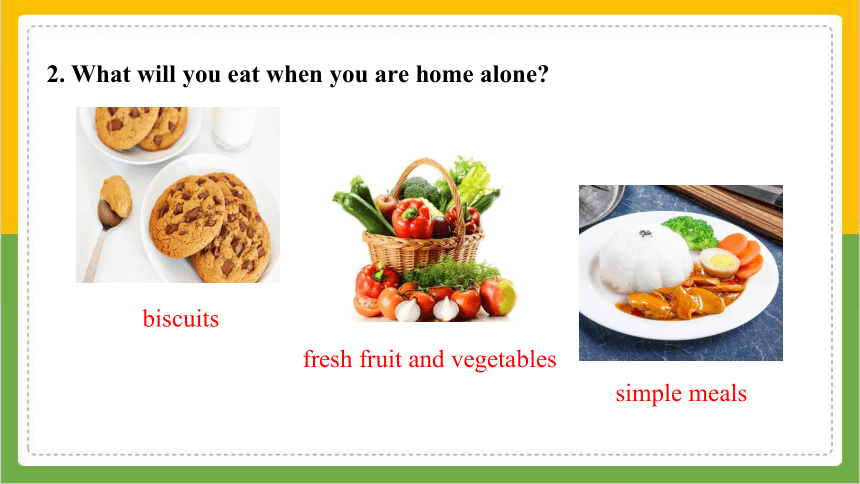
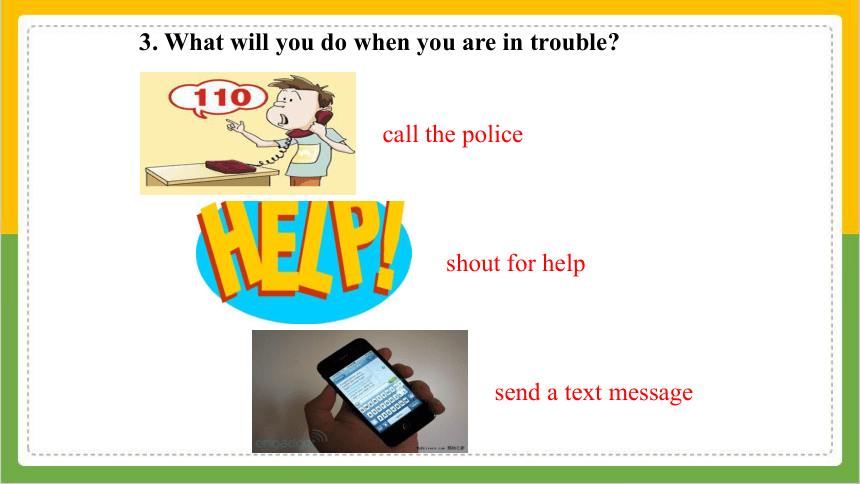
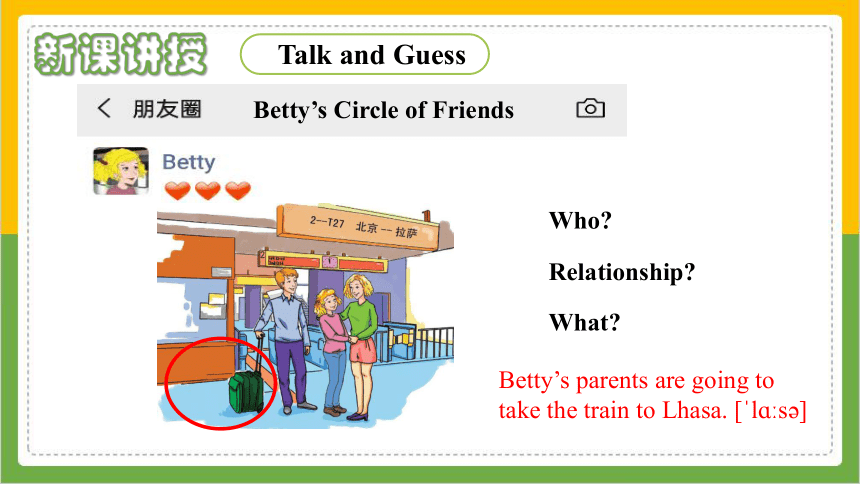
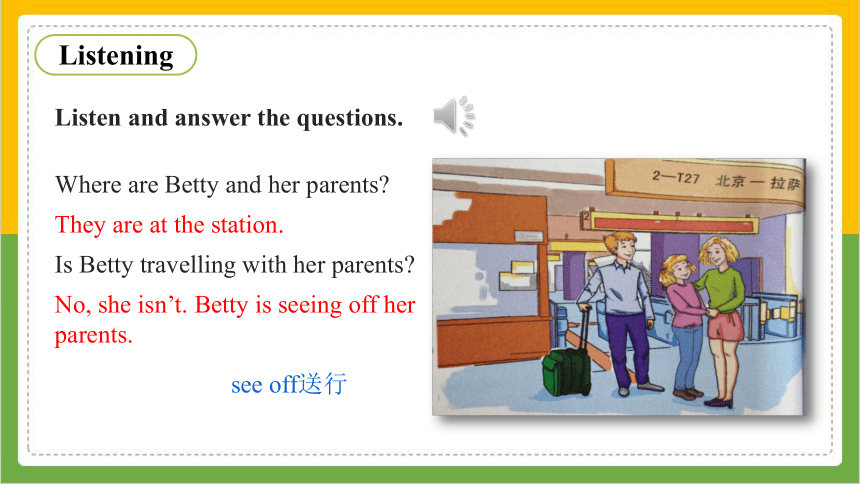
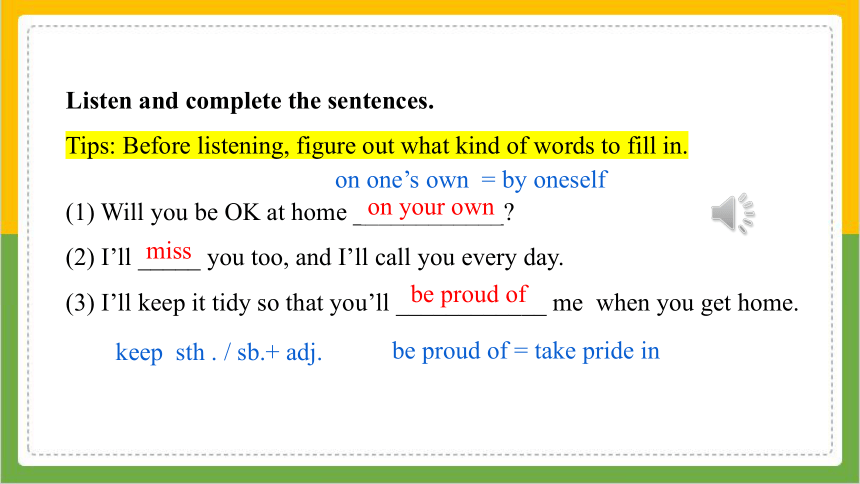
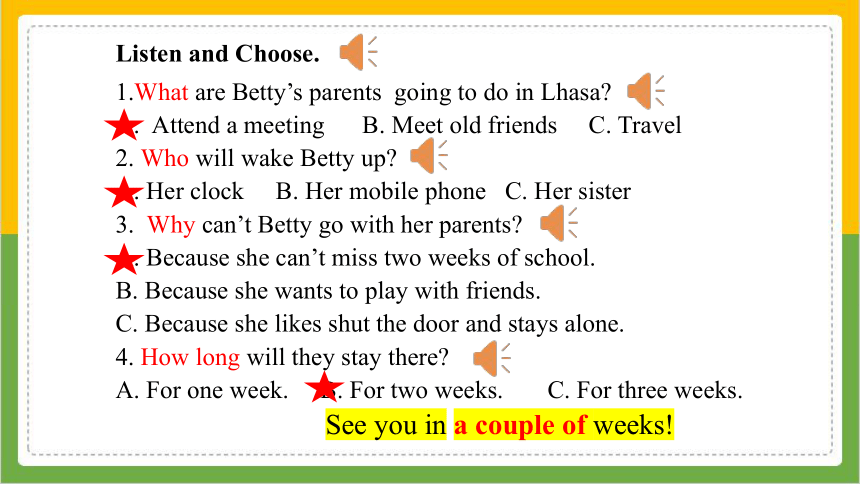
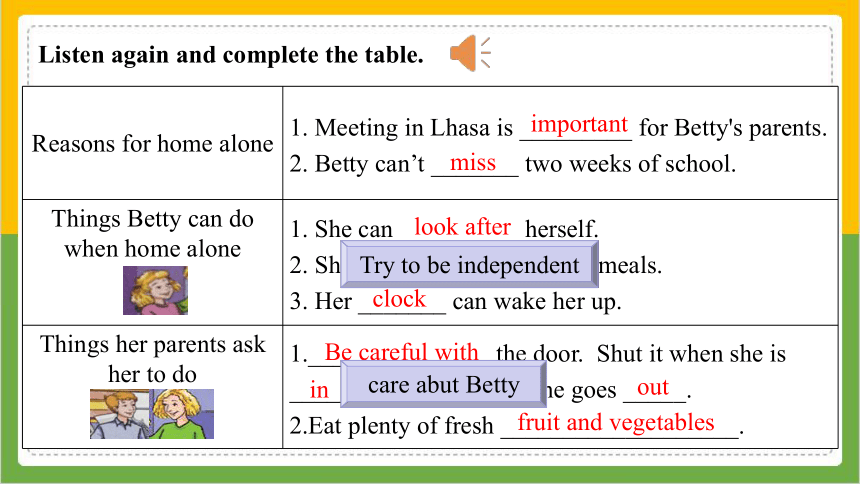

文档简介
(共32张PPT)
Unit 1 I can look after myself, although it won’t be easy for me.
Module 4 Home alone
To learn some key words and useful expressions
To be able to understand the conversation about living alone at home
学习目标
1. Have you ever been alone at home
2. What will you do if you are alone at home
Lead in
1. What’s the most important when you are home alone
shut/ t/ the door
lock the door
Shut the door when you’re in.
Lock the door when you go out.
Be careful with the door.
Brainstorming
2. What will you eat when you are home alone
biscuits
fresh fruit and vegetables
simple meals
call the police
send a text message
3. What will you do when you are in trouble
shout for help
Betty’s Circle of Friends
Who
Relationship
What
Betty’s parents are going to take the train to Lhasa. [ lɑ s ]
新课讲授
Talk and Guess
Listen and answer the questions.
Where are Betty and her parents
They are at the station.
Is Betty travelling with her parents
No, she isn’t. Betty is seeing off her parents.
see off送行
Listening
Listen and complete the sentences.
adv.
(1) Will you be OK at home ____________
(2) I’ll _____ you too, and I’ll call you every day.
(3) I’ll keep it tidy so that you’ll ____________ me when you get home.
on your own
Tips: Before listening, figure out what kind of words to fill in.
v.
miss
v.
be proud of
on one’s own = by oneself
keep sth . / sb.+ adj.
be proud of = take pride in
1.What are Betty’s parents going to do in Lhasa
Attend a meeting B. Meet old friends C. Travel
2. Who will wake Betty up
A. Her clock B. Her mobile phone C. Her sister
3. Why can’t Betty go with her parents
A. Because she can’t miss two weeks of school.
B. Because she wants to play with friends.
C. Because she likes shut the door and stays alone.
4. How long will they stay there
A. For one week. B. For two weeks. C. For three weeks.
Listen and Choose.
See you in a couple of weeks!
Reasons for home alone 1. Meeting in Lhasa is _________ for Betty's parents.
2. Betty can’t _______ two weeks of school.
Things Betty can do when home alone 1. She can __________herself.
2. She can __________simple meals.
3. Her _______ can wake her up.
Things her parents ask her to do _______________the door. Shut it when she is _____ and lock it when she goes _____.
Eat plenty of fresh ___________________.
clock
fruit and vegetables
Be careful with
important
miss
Listen again and complete the table.
in
out
look after
cook
Try to be independent
care abut Betty
Watch and imitate.
1. So am I, but I can’t miss two weeks of school.
我也是很遗憾,但是我不能两周不上课。
“so+ be/助动词/情态动词+主语”这一结构表示自己与前一个人的情况相同或同意前一个人的说法,意思是“……也这样”。
1)Joe was a little upset, and so was I.
乔有点不开心,我也有点儿。
2)He has been ill, and so has his wife.
他一直生着病,他妻子也一样。
3)Neil left just after midnight, and so did Jack.
尼尔一过午夜就走了,杰克也是。
Language points
【拓展】
1. 当表示前面所述的某一否定情况也同样适用于另一主语是,则用“Neither/Nor+连系动词be/助动词/情态动词+主语”,意为“……也不”。
My father hasn’t been to Hong Kong. Neither has my mother.
Tip: 在两种倒装结构中,连系动词be、助动词或情态动词在时态上要与前面句子中的谓语动词保持一致;在数上要与本倒装句的主语保持一致。
2. “So+主语+连系动词be/助动词/情态动词”,这一结构表示赞成对方所说的话,可译成“……的确如此”。
- It was very cold yesterday.
- So it was.
1. —I always hate being late for school.
— .
A. So am I. B. So do I.
C. So I am. D. So I do.
2. —Andy, will your cousin go for a picnic this Sunday
—If I don’t go, ________.
A.so does he B.so he does
C.neither will he D.neither does he
3. —Mary has never kept a pet.
—________.
A.Neither did I B.So have I
C.Neither have I D.So am I
miss v. 想念、未击中、未达到、错过
miss doing sth 错过做某事
那个男孩未击中球 。
That boy missed hitting the baseball.
2. I can look after myself, although it won’t be easy for me.
我能照顾好自己,尽管那对我来说不那么容易。
although 表示“虽然,尽管”,引导让步状语从句。类似的词和词组还有though, even though等。这些词和词组引导让步状语从句时,不能和but连用。
Although the sun was shining, it wasn’t very warm.
虽然阳光灿烂,但是天气还是不暖和。
1. Although I was only six, I can remember seeing it on TV.
____________________________________________________
2. He often helps me with my English although he is quite busy.
_____________________________________
尽管他相当忙,但是还常常帮我学英语。
虽然当时我只有6岁,我还能记得在电视上看到过它。
3. There won’t be anybody to wake you up in the morning.
wake up “唤醒/吵醒某人”
当被叫醒的对象是人称代词时,用宾格,且必须放在短语中间;
当被叫醒的对象是名词时,可放在短语中间,或后面。
1) My mother woke me up very early this morning.
今天早晨妈妈很早就叫醒了我。
2) Tom, thanks for waking my cousin up/ waking up my cousin every day.
汤姆,谢谢你每天叫我表弟起床。
早上将没有人叫你起床。
4. My clock ring so loudly that it will certainly wake me up.
我的闹钟声音如此响肯定会把我闹醒的。
ring v. 发出铃声、打电话 n. 戒指
铃声什么时候响?
When does the bell ring
“so + adj./adv. + that + 从句”的结构,意思是“如此…以至于…”
Math homework was ________________(如此难)he could not finish it last night.
2. My clock rings _____________(如此响亮)I can wake up on time.
3. 他今天早上起得如此晚以至于错过了火车。
so difficult that
so loudly that
This morning he woke up so late that he missed the train.
5. Your train is about to leave.
be about to do sth. 就要/正要做某事.
e.g. The supermarket is about to make new activities.
超市将推出新的活动。
注意:be about to do 不能与 tomorrow 等表示将来的具体的时间状语词连用,但可与 when 构成 be about to do... when... 句型意为“正要做某事...这时...”.
1. 士兵们正要离开村庄的时候,村民们都出来送他们。
When the soldiers ____________________ the village, the villagers came out to see them off.
2. 吉姆刚要睡觉时,他室友的电话响了。
Jim ______________________ when his roommate’s phone rang.
were about to leave
was about to go to bed
so…that…引导_____________,表示 “如此……以至于……”,so后面接形容词或副词,that后接从句。
although引导______________,表示“尽管……, (但是)……”。
在英语中although/though和___不能同时使用。
让步状语从句
but
结果状语从句
Pay attention to the adverbial clauses with although and so…that.
Choose the correct answer.
address, lock, meeting, passenger, ring, shut, text message
1. “I haven’t given you our address in Lhasa!” This means you do not know where we are staying / what we are doing.
2. You see passengers travelling by train / staying at home.
3. When your clock rings, it is quiet / makes a loud noise.
4.You receive a text message is a on your phone/ by email.
5. When the door is shut, it is open / closed.
6. When you lock the door, you keep people out / let people in.
7. At a meeting, you meet people for work / fun.
Practice
Betty’s parents are going to _____ . She will be at home _____. Of course, they are worried about her.
At the station, her mother tells her to be _______ with the door and eat plenty of fresh ______ and _________.
Betty tells them not to worry. She can look after _______. She can _______ simple meals and her clock can ______ her up.
Her parents will be back in __________weeks. They must be happy to see each other then.
vegetables
careful
fruit
Lhasa
alone
herself
cook
wake
a couple of
Retell
We are old enough to grow as a person.
It’s time to learn to be independent.
How to look after yourself
After learning this unit, what are your feelings
Thinking
Check the following sentences and write or .
Do
Don’t
Shut the door after getting home.
Finish your homework.
Use the stove (炉).
Leave the house without permission.
Call the police if there is an emergency.
Tell others you are home alone.
Answer the door to strangers.
Do
Don't
Do
Do
Don't
Don't
Don't
How to look after yourself
Imagine you are staying at home by yourself.
A: Can you look after yourself
B: Yes, I can. / No, I can’t.
A: How will you make sure you wake up in the morning
B: I’ll……
A: How will you eat
B: I’ll……
A: How will you manage your homework
B: I’ll……
A: In my opinion, it’s important to……when you stay at home alone.
Work in pairs.
1. “辅音+元音”型(即相邻两词中的前一个词是以辅音结尾,后一个词以元音开头)
eg: Please pick it up.
Not at all.
英语连读的规则:
2. “辅音+半元音”型(即前一个词以元音开头,后一个词以/j/,/w/开头)
eg: Thank you.
Did you get there late again
Pronunciation and speaking
3. “元音+元音”型(即前一个词以元音结尾,后一个词以元音开头,这两个词往往要自然而不间断地连读)
eg: It will take you three hours to walk there.
Listen and mark the words which the speaker links.
Now listen again and repeat.
Unit 1 I can look after myself, although it won’t be easy for me.
Module 4 Home alone
To learn some key words and useful expressions
To be able to understand the conversation about living alone at home
学习目标
1. Have you ever been alone at home
2. What will you do if you are alone at home
Lead in
1. What’s the most important when you are home alone
shut/ t/ the door
lock the door
Shut the door when you’re in.
Lock the door when you go out.
Be careful with the door.
Brainstorming
2. What will you eat when you are home alone
biscuits
fresh fruit and vegetables
simple meals
call the police
send a text message
3. What will you do when you are in trouble
shout for help
Betty’s Circle of Friends
Who
Relationship
What
Betty’s parents are going to take the train to Lhasa. [ lɑ s ]
新课讲授
Talk and Guess
Listen and answer the questions.
Where are Betty and her parents
They are at the station.
Is Betty travelling with her parents
No, she isn’t. Betty is seeing off her parents.
see off送行
Listening
Listen and complete the sentences.
adv.
(1) Will you be OK at home ____________
(2) I’ll _____ you too, and I’ll call you every day.
(3) I’ll keep it tidy so that you’ll ____________ me when you get home.
on your own
Tips: Before listening, figure out what kind of words to fill in.
v.
miss
v.
be proud of
on one’s own = by oneself
keep sth . / sb.+ adj.
be proud of = take pride in
1.What are Betty’s parents going to do in Lhasa
Attend a meeting B. Meet old friends C. Travel
2. Who will wake Betty up
A. Her clock B. Her mobile phone C. Her sister
3. Why can’t Betty go with her parents
A. Because she can’t miss two weeks of school.
B. Because she wants to play with friends.
C. Because she likes shut the door and stays alone.
4. How long will they stay there
A. For one week. B. For two weeks. C. For three weeks.
Listen and Choose.
See you in a couple of weeks!
Reasons for home alone 1. Meeting in Lhasa is _________ for Betty's parents.
2. Betty can’t _______ two weeks of school.
Things Betty can do when home alone 1. She can __________herself.
2. She can __________simple meals.
3. Her _______ can wake her up.
Things her parents ask her to do _______________the door. Shut it when she is _____ and lock it when she goes _____.
Eat plenty of fresh ___________________.
clock
fruit and vegetables
Be careful with
important
miss
Listen again and complete the table.
in
out
look after
cook
Try to be independent
care abut Betty
Watch and imitate.
1. So am I, but I can’t miss two weeks of school.
我也是很遗憾,但是我不能两周不上课。
“so+ be/助动词/情态动词+主语”这一结构表示自己与前一个人的情况相同或同意前一个人的说法,意思是“……也这样”。
1)Joe was a little upset, and so was I.
乔有点不开心,我也有点儿。
2)He has been ill, and so has his wife.
他一直生着病,他妻子也一样。
3)Neil left just after midnight, and so did Jack.
尼尔一过午夜就走了,杰克也是。
Language points
【拓展】
1. 当表示前面所述的某一否定情况也同样适用于另一主语是,则用“Neither/Nor+连系动词be/助动词/情态动词+主语”,意为“……也不”。
My father hasn’t been to Hong Kong. Neither has my mother.
Tip: 在两种倒装结构中,连系动词be、助动词或情态动词在时态上要与前面句子中的谓语动词保持一致;在数上要与本倒装句的主语保持一致。
2. “So+主语+连系动词be/助动词/情态动词”,这一结构表示赞成对方所说的话,可译成“……的确如此”。
- It was very cold yesterday.
- So it was.
1. —I always hate being late for school.
— .
A. So am I. B. So do I.
C. So I am. D. So I do.
2. —Andy, will your cousin go for a picnic this Sunday
—If I don’t go, ________.
A.so does he B.so he does
C.neither will he D.neither does he
3. —Mary has never kept a pet.
—________.
A.Neither did I B.So have I
C.Neither have I D.So am I
miss v. 想念、未击中、未达到、错过
miss doing sth 错过做某事
那个男孩未击中球 。
That boy missed hitting the baseball.
2. I can look after myself, although it won’t be easy for me.
我能照顾好自己,尽管那对我来说不那么容易。
although 表示“虽然,尽管”,引导让步状语从句。类似的词和词组还有though, even though等。这些词和词组引导让步状语从句时,不能和but连用。
Although the sun was shining, it wasn’t very warm.
虽然阳光灿烂,但是天气还是不暖和。
1. Although I was only six, I can remember seeing it on TV.
____________________________________________________
2. He often helps me with my English although he is quite busy.
_____________________________________
尽管他相当忙,但是还常常帮我学英语。
虽然当时我只有6岁,我还能记得在电视上看到过它。
3. There won’t be anybody to wake you up in the morning.
wake up “唤醒/吵醒某人”
当被叫醒的对象是人称代词时,用宾格,且必须放在短语中间;
当被叫醒的对象是名词时,可放在短语中间,或后面。
1) My mother woke me up very early this morning.
今天早晨妈妈很早就叫醒了我。
2) Tom, thanks for waking my cousin up/ waking up my cousin every day.
汤姆,谢谢你每天叫我表弟起床。
早上将没有人叫你起床。
4. My clock ring so loudly that it will certainly wake me up.
我的闹钟声音如此响肯定会把我闹醒的。
ring v. 发出铃声、打电话 n. 戒指
铃声什么时候响?
When does the bell ring
“so + adj./adv. + that + 从句”的结构,意思是“如此…以至于…”
Math homework was ________________(如此难)he could not finish it last night.
2. My clock rings _____________(如此响亮)I can wake up on time.
3. 他今天早上起得如此晚以至于错过了火车。
so difficult that
so loudly that
This morning he woke up so late that he missed the train.
5. Your train is about to leave.
be about to do sth. 就要/正要做某事.
e.g. The supermarket is about to make new activities.
超市将推出新的活动。
注意:be about to do 不能与 tomorrow 等表示将来的具体的时间状语词连用,但可与 when 构成 be about to do... when... 句型意为“正要做某事...这时...”.
1. 士兵们正要离开村庄的时候,村民们都出来送他们。
When the soldiers ____________________ the village, the villagers came out to see them off.
2. 吉姆刚要睡觉时,他室友的电话响了。
Jim ______________________ when his roommate’s phone rang.
were about to leave
was about to go to bed
so…that…引导_____________,表示 “如此……以至于……”,so后面接形容词或副词,that后接从句。
although引导______________,表示“尽管……, (但是)……”。
在英语中although/though和___不能同时使用。
让步状语从句
but
结果状语从句
Pay attention to the adverbial clauses with although and so…that.
Choose the correct answer.
address, lock, meeting, passenger, ring, shut, text message
1. “I haven’t given you our address in Lhasa!” This means you do not know where we are staying / what we are doing.
2. You see passengers travelling by train / staying at home.
3. When your clock rings, it is quiet / makes a loud noise.
4.You receive a text message is a on your phone/ by email.
5. When the door is shut, it is open / closed.
6. When you lock the door, you keep people out / let people in.
7. At a meeting, you meet people for work / fun.
Practice
Betty’s parents are going to _____ . She will be at home _____. Of course, they are worried about her.
At the station, her mother tells her to be _______ with the door and eat plenty of fresh ______ and _________.
Betty tells them not to worry. She can look after _______. She can _______ simple meals and her clock can ______ her up.
Her parents will be back in __________weeks. They must be happy to see each other then.
vegetables
careful
fruit
Lhasa
alone
herself
cook
wake
a couple of
Retell
We are old enough to grow as a person.
It’s time to learn to be independent.
How to look after yourself
After learning this unit, what are your feelings
Thinking
Check the following sentences and write or .
Do
Don’t
Shut the door after getting home.
Finish your homework.
Use the stove (炉).
Leave the house without permission.
Call the police if there is an emergency.
Tell others you are home alone.
Answer the door to strangers.
Do
Don't
Do
Do
Don't
Don't
Don't
How to look after yourself
Imagine you are staying at home by yourself.
A: Can you look after yourself
B: Yes, I can. / No, I can’t.
A: How will you make sure you wake up in the morning
B: I’ll……
A: How will you eat
B: I’ll……
A: How will you manage your homework
B: I’ll……
A: In my opinion, it’s important to……when you stay at home alone.
Work in pairs.
1. “辅音+元音”型(即相邻两词中的前一个词是以辅音结尾,后一个词以元音开头)
eg: Please pick it up.
Not at all.
英语连读的规则:
2. “辅音+半元音”型(即前一个词以元音开头,后一个词以/j/,/w/开头)
eg: Thank you.
Did you get there late again
Pronunciation and speaking
3. “元音+元音”型(即前一个词以元音结尾,后一个词以元音开头,这两个词往往要自然而不间断地连读)
eg: It will take you three hours to walk there.
Listen and mark the words which the speaker links.
Now listen again and repeat.
同课章节目录
- Module 1 Wonders of the world
- Unit 1 It's more than 2,000 years old.
- Unit 2 The Grand Canyon was not just big.
- Unit 3 Language in use
- Module 2 Public holidays
- Unit 1 My family always go somewhere interesting a
- Unit 2 We have celebrated the festival since the f
- Unit 3 Language in use
- Module 3 Heroes
- Unit 1 She trained hard,so she became a great play
- Unit 2There were few doctors, so he had to work ve
- Unit 3 Language in use
- Module 4 Home alone
- Unit 1 I can look after myself, although it won’t
- Unit 2 I became so bored with their orders that I
- Unit 3 Language in use
- Module 5 Museums
- Unit 1 Don't cross that rope!
- Unit 2 If you ever go to London, make sure you vis
- Unit 3 Language in use
- Module 6 Problems
- Unit 1 If I start after dinner, I'll finish it be
- Unit 2 If you tell him the truth now, you will sho
- Unit 3 Language in use
- Revision Module A
- Module 7 Great books
- Unit 1 We're still influenced by Confucius's idea
- Unit 2 It is still read and loved.
- Unit 3 Language in use
- Module 8 Sports life
- Unit 1 Daming wasn't chosen for the team last time
- Unit 2 He was invited to competitions around the w
- Unit 3 Language in use
- Module 9 Great inventions
- Unit 1 Will computers be used more than books in t
- Unit 2 Will books be replaced by the Internet?
- Unit 3 Language in use
- Module 10 Australia
- Unit 1 I have some photos that I took in Australia
- Unit 2 The game that they like most is Australian
- Unit 3 Language in use
- Module 11 Photos
- Unit 1 He's the boy who won the photo competition
- Unit 2 The photo which we liked best was taken by
- Unit 3 Language in use
- Module 12 Save our world
- Unit 1 If everyone starts to do something, the wor
- Unit 2 Repeat these three words daily: reduce, reu
- Unit 3 Language in use
- Revision Module B
